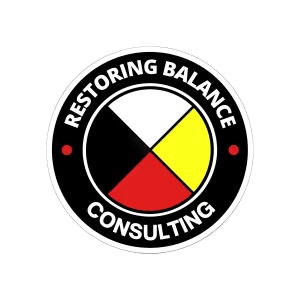Welcome to Restoring Balance Consulting
BLOG
News, Articles, Information and Achievements…
Author Provides a New Perspective to Canadian History
THE NORTHERN VIEW Published: July 07, 2009 11:00 PM Gerald Kiesman has written a new book giving a unique look at Canadian history through First Nations perspective. Former Prince Rupert resident Gerald Kiesman was in town late last month to promote his self-published...
Police Victim Services Seeks Closer Ties to First Nations Culture
Gerald Kiesman is giving workshops for Victoria Police Victim Services about grieving as it relates to First Nations culture. Don Denton/News staff Spurred by the bravery of NHL hockey player Sheldon Kennedy in announcing he had been sexually abused, Gerald Kiesman...
Ex-Rupert Resident Helping with Healing
Gerald Kiesman has accomplished a great deal in the eight years since he moved awayfrom Prince Rupert. Prince Rupert Daily NewsJune 9, 2008 Gerald Kiesman has accomplished a great deal in the eight years since he moved awayfrom Prince Rupert. A resident of the city...
Former Child Abuse Victim Plans Healing Conference
Standing Proud Story Diagram and Meaning
Becoming the First Urban Aboriginal Delegate Worker in Victoria
Certificate of Appreciation to Gerald Kiesman
The Victims Advisory Council, Correctional Service of Canada and the Parole Board of Canada present Certificate of Appreciation Feb 4, 2011
Assembly of Manitoba Chiefs Gathering
Gerald Kiesman taking part on a panel, discussing the topic "Unmarked Graves and Genocide" October 24, 2023
Victim Makes Trauma Kit
Shayne Morrow / Alberni Valley TimesJune 4, 2008 In 1998, Prince Rupert resident Gerald Kiesman couldn't find the resources he needed to dealwith a past history of trauma and abuse. Ten years later, after intense counselling and extensivetraining, he's created a...
The Ninth Healing Our Spirit Worldwide
Siksika Health and Wellness
SIKSIKA HEALTH AND WELLNESS MENTAL HEALTH Flood Support 1 Day Workshop “On Understanding Trauma & Post Traumatic Stress Disorder” Download Full PDF SHS-Workshop
Two Row Times
Two-day Gathering Discusses Trauma of Indigenous Children in Foster Care System SIX NATIONS ‑ When soldiers experience war, it affects every aspect of the victim – spirit, soul and body. This condition is known as Post Traumatic Stress Disorder. by Jim WindleNovember...
Author Provides a New Perspective to Canadian History
THE NORTHERN VIEW Published: July 07, 2009 11:00 PM
Gerald Kiesman has written a new book giving a unique look at Canadian history through First Nations perspective.
Former Prince Rupert resident Gerald Kiesman was in town late last month to promote his self-published book Zero Sum Game, which offers a unique look at Canadian history through the First Nations perspective, as well as the Trauma Healing Kit that he’s developed over 11 years of devoted personal research.
Both detailed and concise, Kiesman said he chose to “rewrite Canadian history” to provide a more thorough understanding of Canadian history as it truly affected various Aboriginal groups.
“I’ve heard many times, a lot of people get upset about what they hear because most history is really written from a European perspective and not many [Aboriginal people] have come out and talked about how it’s all really impacted us,” he said.
The book spans centuries, from pre-settlement to modern time, but only runs about 300 pages and includes photos, hand-created diagrams and graphics to get across a point that is massively condensed, sometimes even in point form.
“My goal with this, like with the trauma kit, was to create something that the average person could appreciate,” said Kiesman.
“Especially with self-healing books I was finding at the library, I just always found that the books were written in a very academic way and it makes it very difficult for the layman to understand it.”
Of German and Haida ancestry, Kiesman was driven to explore his personal history after some personal revelations in the late 90’s that also led to his trauma kit concept.
“NHL player Sheldon Kennedy shocked the world when he disclosed that he’d suffered sexual abuse from his [junior] coach,” said Kiesman, explaining the spark that got him starting his own healing.
“The way he handled it brought up everything for me and started my own healing.”
But because of the academic nature of the books, it took dedicated research to understand, let alone implement, the things the books taught.
Upon moving to Victoria in 2000, Kiesman got into counseling and through professional sources, more research and information obtained from professors at UBC and UVIC, Kiesman put together his trauma resource kit, which seeks to identify the source of trauma, provides a detailed description of how trauma affects the mind and body in an easily understandable way and provides exercises to help the healing process.
“I grew up seeing the community suffering from the legacy of residential schools and I more or less developed this idea based on community based healing,” said Kiesman.
“The guide teaches people to focus a lot on thoughts, to focus on behaviors and to explore every sensory that comes in, to know what kind of an imprint it leaves on the mind and body.”
Kiesman’s workshops, which use journaling and art therapy, have been conducted dozens of times across the province in the last year, including about 15 in the Northwest.
Healing guides specifically designed for Aboriginal youth, for former residential school students, for Aboriginal people with disabilities and for adults are also available.
And while some schools have already picked up on Zero Sum Game for First Nations studies classes, Kiesman hopes to next get his trauma healing kit out to wider audiences, with a specific focus on troops returning home war.
“You hear a lot about what’s happening to those soldiers coming back from battle,” said Kiesman.
“I think it would be very beneficial for them. I would also like to see this used through the truth and reconciliation process.”
Kiesman’s books are now available in the Northwest at Rainforest Books and can also be found at Misty Rivers Books in Terrace.
Police Victim Services Seeks Closer Ties to First Nations Culture
Gerald Kiesman is giving workshops for Victoria Police Victim Services about grieving as it relates to First Nations culture.
Don Denton/News staff
Spurred by the bravery of NHL hockey player Sheldon Kennedy in announcing he had been sexually abused, Gerald Kiesman confronted his own secrets.
Kiesman, too, had experienced such mistreatment. A year after Kennedy’s proclamation, which helped lead to the arrest and conviction of junior hockey coach Graham James, Kiesman decided he needed to do something about his ordeal.
It was the beginning of a nine-year process that led him to a counselling profession in which he incorporates his culture – Haida Nation traditions. “Understanding grieving and trauma (practices) is different for different nations,” he said.
Kiesman’s knowledge of North Coast traditional healing methods and First Nations cultures will be shared during volunteer recruitment for Greater Victoria Police Victim Services. The agency invited him to be a part of its workshops on helping people deal with trauma and grief.
It’s the first time the service has focused on First Nations culture, victim services executive director Geraldine Glattstein said. The move is part of a push to widen accessibility to and diversity of its services.”With all communities, it’s about developing a relationship,” she said.
As a way to encourage more people to use the service and to recruit volunteers with varying backgrounds, Glattstein said, Victim Services is looking at providing transportation, food and child-care subsidies for clients and volunteers.
“If you are serious about access and diversity you have to put your money where your mouth is.” The agency needs roughly 60 volunteers to maintain its operations. Currently, it has 30.
Training for positions consists of 70 hours over 12 weeks. Once completed, a volunteer works approximately three hours a week in the centre’s office and is on call once a month.
For more information, please visit www.gvpvs.org.
raldous@vicnews.com
Ex-Rupert Resident Helping with Healing
Gerald Kiesman has accomplished a great deal in the eight years since he moved away
from Prince Rupert.
Prince Rupert Daily News
June 9, 2008
Gerald Kiesman has accomplished a great deal in the eight years since he moved away
from Prince Rupert.
A resident of the city for 35 years, he left in 2000 and headed to Victoria seeking to find
the resources he needed to deal with a history of trauma and abuse. From the moment he
took his first counseling class and gained employment in the field, he has gone on to
research how trauma impacts the mind and body, and recently created a Trauma Resource
Kit for Aboriginal Communities.
“In ’98 I started my healing and realized there was a lack of materials and books that were
available in layman’s terms, because a lot of books about trauma are written by
psychologists,” said Kiesman. “So, for the average person trying to heal, I found a lack of
resources. There’s also a lack of services to help people confronting childhood and other
types of trauma.”
One of Kiesman’s major focuses has been on helping residential school survivors and
inter-generations deal with their trauma, and the kit he has created includes healing
guides for former residential school students, as well as Aboriginal children, youths and
people with disabilities. The kit also includes a training manual for frontline workers, as
well as the theory behind trauma and post-traumatic stress disorder.
Since working through his own healing, Kiesman worked with several trauma projects,
attended nearly 150 alternative dispute hearings, trained in therapeutic re-enactment at
the University of British Columbia and in trauma counseling at the University of
Victoria. He says that after all he has learned, it became obvious that one of the key
problems in Canada is the availability of resources for trauma victims, which is why he
began working with the B.C. Aboriginal Network on Disability Society in October on the
B.C. Aboriginal Restorative Health Project.
“It was a pilot-project to provide training on trauma and PTSD to frontline workers, as
well as healing workshops in different communities,” said Kiesman. “One of the target
areas I’ve been working in is the North Coast, including Terrace, Kitimat, and
Morricetown, and I’ve done two healing workshops in Prince Rupert for the Nisga’a
Society. The response has really been excellent.”
The launch of Kiesman’s trauma resource kit coincides with Canada’s official apology to
residential school survivors, which the Prime Minister will deliver on Wednesday.
Kiesman said he wanted the kit to be available to Aboriginal communities before the
apology, as he believes it will include healing but will also cause many communities to
re-live the trauma of the past.
Copies of the kit, other support materials and more information on Kiesman can be found
by contacting Gerald at kiesmangerald@hotmail.com
To find out how to subscribe to the Daily News (we can mail the paper anywhere), please
give us a call at (250) 624-6785 or call toll free 1-800-343-0022.
© (c) CanWest MediaWorks Publications Inc
Former Child Abuse Victim Plans Healing Conference

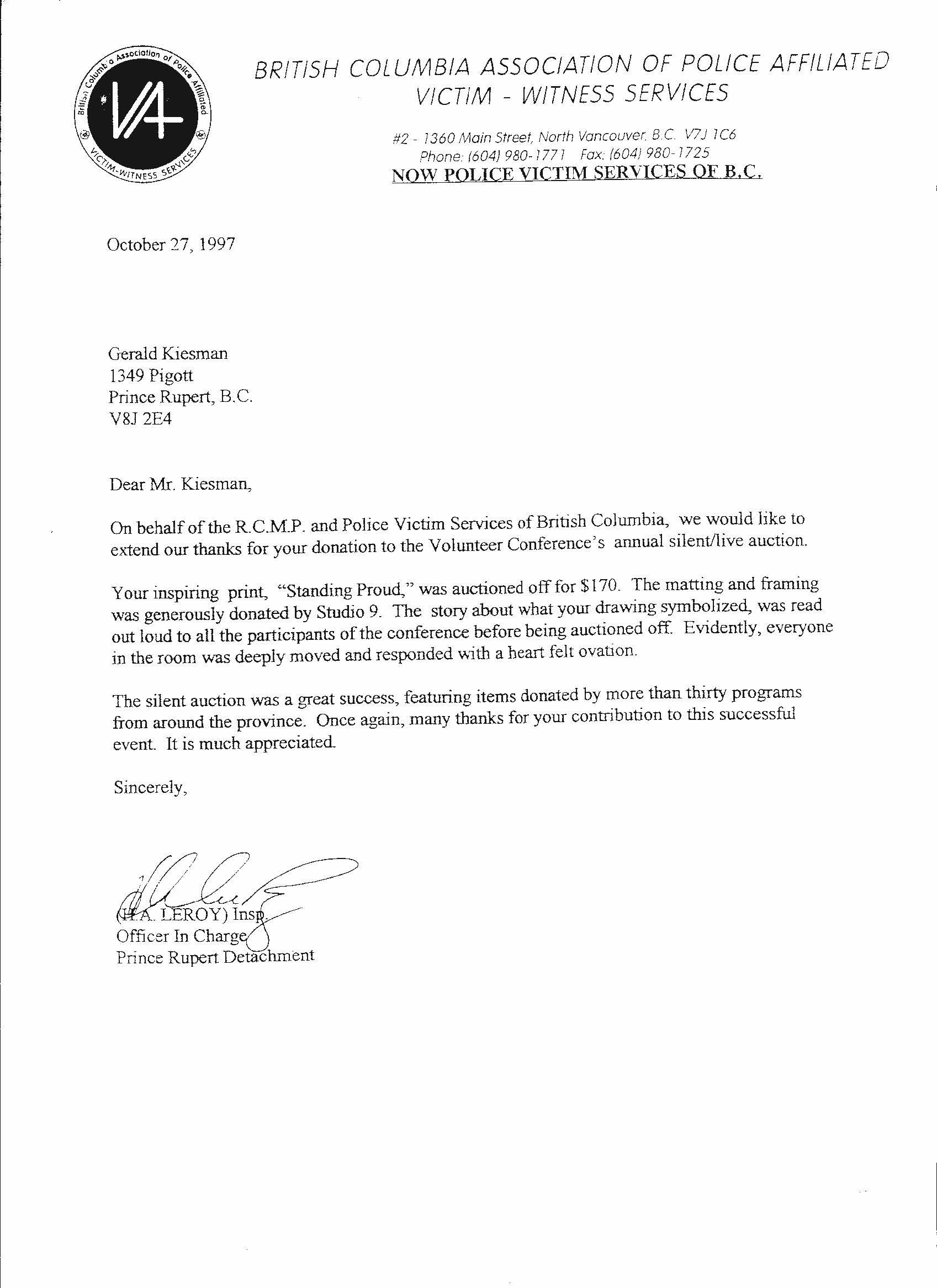
Standing Proud Story Diagram and Meaning
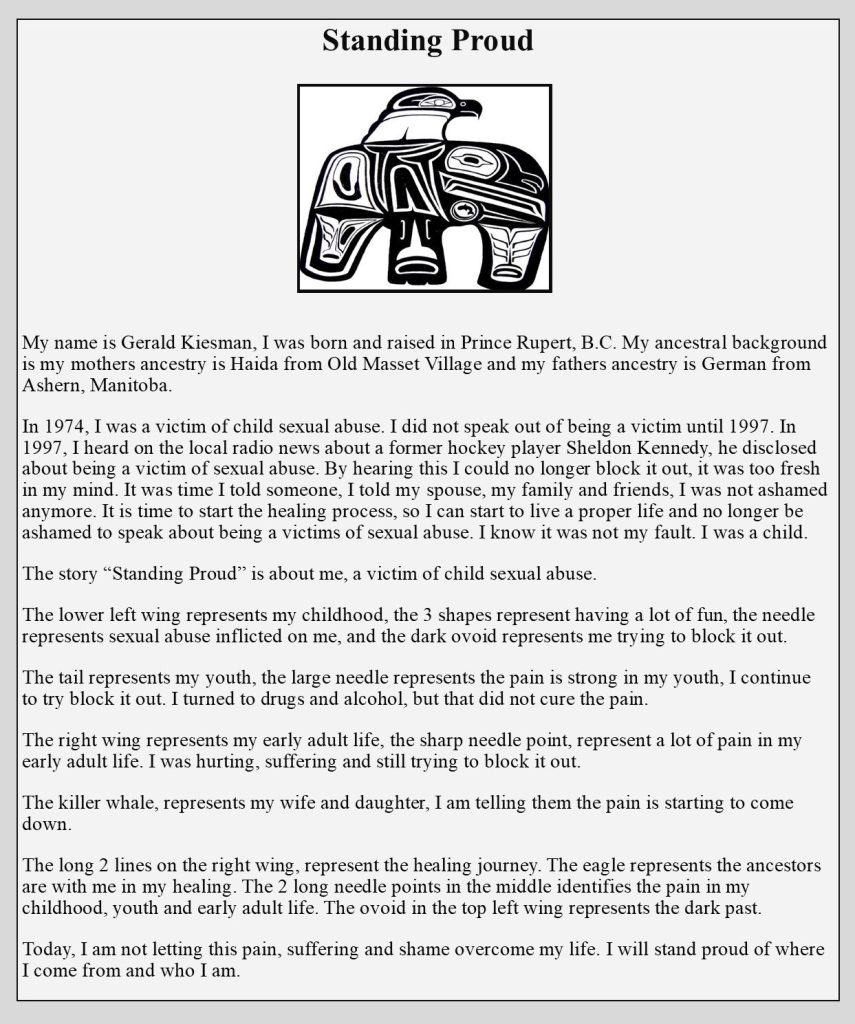
Becoming the First Urban Aboriginal Delegate Worker in Victoria
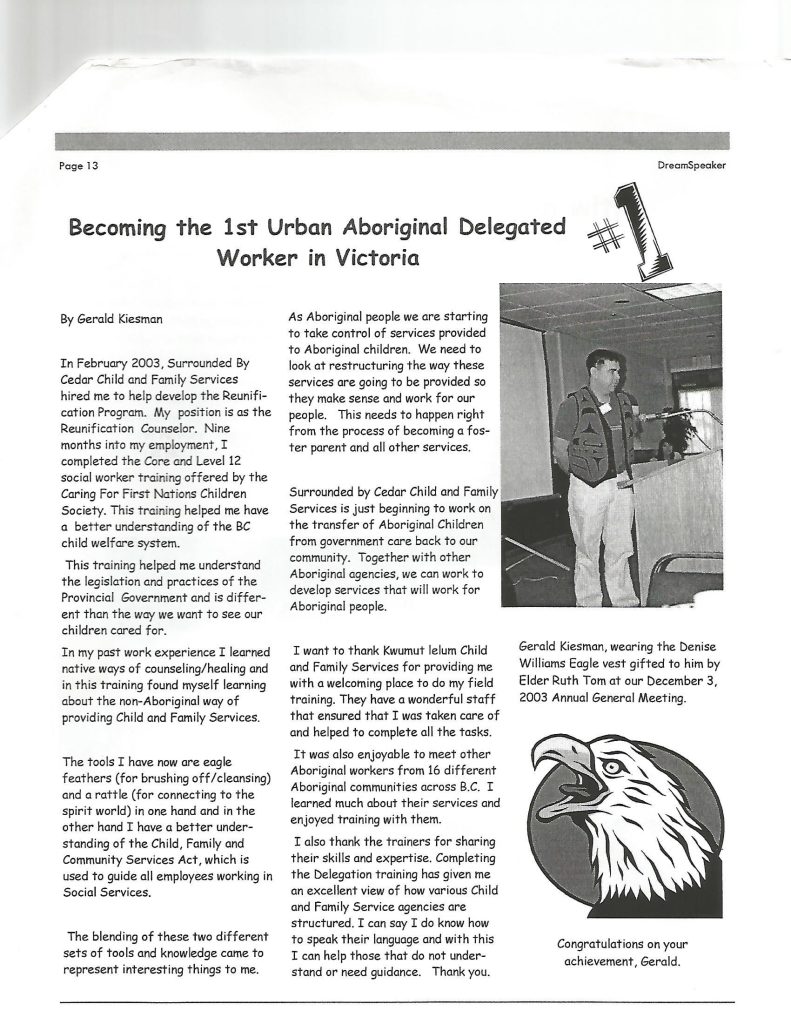
Certificate of Appreciation to Gerald Kiesman
The Victims Advisory Council, Correctional Service of Canada and the Parole Board of Canada present Certificate of Appreciation
Feb 4, 2011
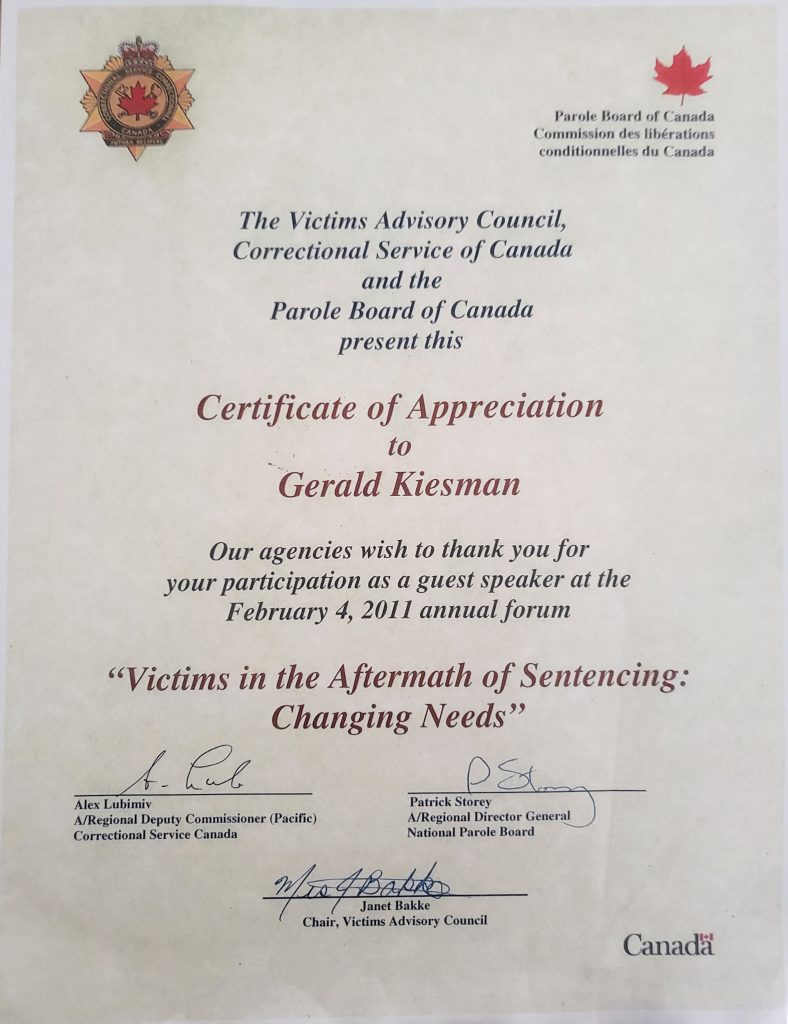
Assembly of Manitoba Chiefs Gathering
Gerald Kiesman taking part on a panel, discussing the topic “Unmarked Graves and Genocide”
October 24, 2023
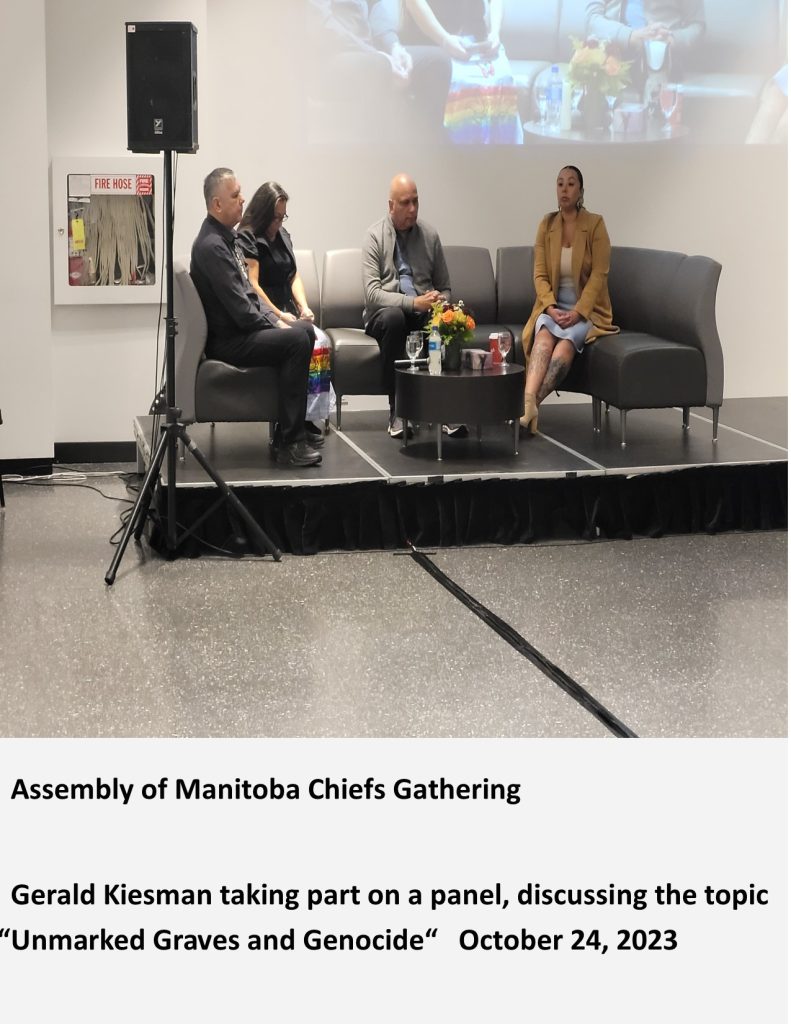
Victim Makes Trauma Kit
Shayne Morrow / Alberni Valley Times
June 4, 2008
In 1998, Prince Rupert resident Gerald Kiesman couldn’t find the resources he needed to deal
with a past history of trauma and abuse. Ten years later, after intense counselling and extensive
training, he’s created a Trauma Resource Kit for Aboriginal Communities.
The kit itself provides resource materials for communities to identify and deal with the victims of
trauma and post-traumatic stress disorder (PTSD) in their midst. And the numbers are staggering,
Kiesman said.
“The B.C. Aboriginal Network on Disability Society (BCANDS) has estimated that 30% of
aboriginal people suffer from PTSD. With about one million aboriginal people in Canada, that’s
300,000 people,” Kiesman told the Times. And the numbers for the non-aboriginal population
are likely to be much higher than anyone would expect, he added.
The Trauma Resource Kit contains a training manual for frontline workers, theory of trauma and
PTSD, and healing guides for residential school survivors, for aboriginal children and youth and
The Alberni Indian Residential School left a legacy of tortured memories for survivors up and
down the B.C. Coast, he noted, and a host of downstream effects for their children.
Kiesman said his own experience led him to go beyond personal healing, and to try to bring
healing to others.
“It all started in 1997, when (former NHL player) Sheldon Kennedy spoke in Prince Rupert,” he
said. Kennedy gained national attention for coming forward with his history of sexual abuse at
the hands of a minor hockey coach. Kiesman said Kennedy’s story led him to pursue charges
against his own childhood abuser.
“I started my healing in 1998, but in those days, you couldn’t find much about trauma and
PTSD,” Kiesman said. But he persevered with his counselling and education, and in 2007,
became involved in a pilot project through BCANDS.
“We visited about 20 aboriginal communities, including some in Nuu-chah-nulth territories,
doing healing workshops on trauma and PTSD,” Kiesman said. Those workshops focussed on
residential school survivors and their adult descendants.
“But over and over, we heard that they wanted something for youth,” he said. That led to the
extension of the trauma kit project to include children and youth.
But in learning about trauma and PTSD in the aboriginal population, Kiesman said he’s come to
realize how pervasive the problem is. He is now near completion of a more generic resource kit
for the non-aboriginal population.
SMorrow@avtimes.net
© Alberni Valley Times
The Ninth Healing Our Spirit Worldwide
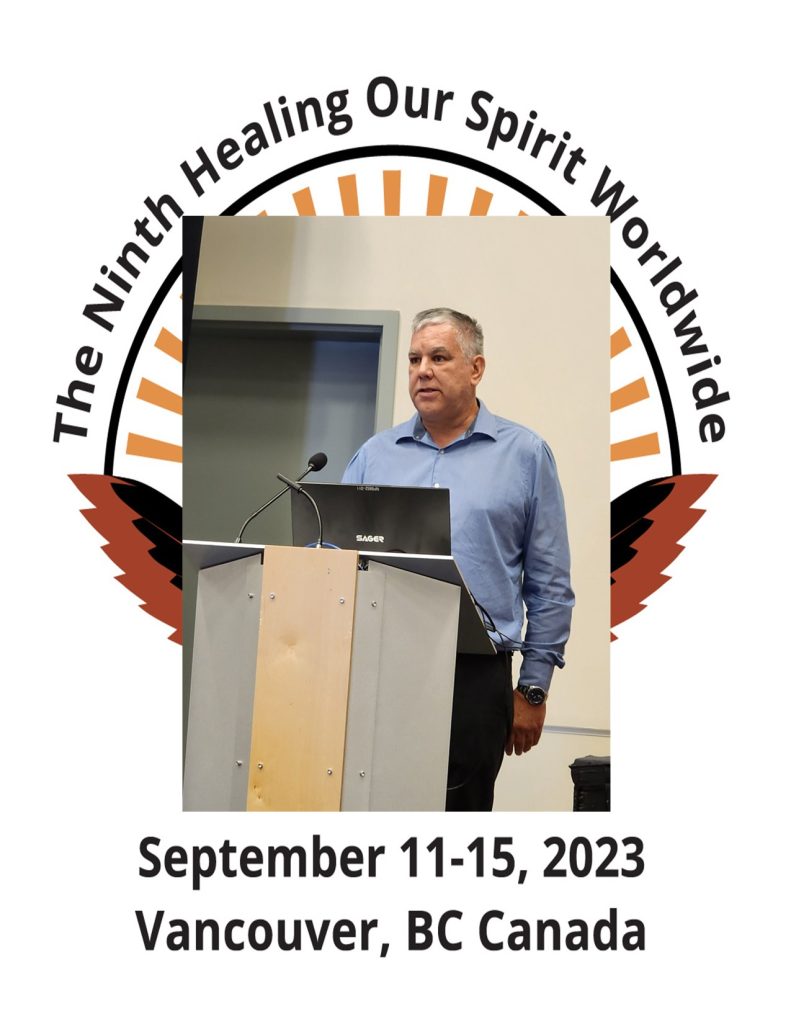
Siksika Health and Wellness
SIKSIKA HEALTH AND WELLNESS MENTAL HEALTH Flood Support 1 Day Workshop “On Understanding Trauma & Post Traumatic Stress Disorder”
Download Full PDF SHS-Workshop
